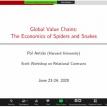The 6th Workshop on Relational Contracts was organized by New Economic School on June 23-24. The event brought together speakers from almost 20 universities from Europe and the US and around 150 participants from across the globe. During the six sessions of the workshop, scholars presented 13 research papers on different aspects of informal relationships also known as relational contract. The contributions explored relationships between organizations as well as within organizations and were both theoretical and empirical.
The keynote lecture was given at the close of the first day by Pol Antras, a renowned international trade economist at Harvard University. His research has emphasized the role of contractual frictions in shaping the international organization of production. In his presentation, he spoke about the consequences of the major developments in the world economy in the last 30 years, like the information and communication technology (ICT) revolution, deepening of trade liberalization and continuing transportation cost reduction and the political developments boosting globalization. Altogether, these factors have led to a gradual relocation of production across borders. He discussed the lessons learned from analyzing, structurally estimating and quantifying multi-country models of global value chains. In particular, he discussed how technology, geography, and institutional quality has shaped the location of production along global value chains.
The Workshop on Relational Contracts has been held annually since 2015. The event is organized by Daniel Barron (Northwestern’s Kellogg School of Management), Matthias Fahn (Johannes Kepler University Linz and CESifo), Marta Troya Martinez (New Economic School and CEPR) and Giorgio Zanarone (Olin Business School and Cunef).
You can find the full program and other details at the official website of the event.
The workshop was supported by






